Related Research Articles
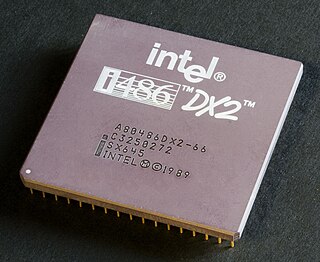
A central processing unit (CPU), also called a central processor, main processor or just processor, is the electronic circuitry that executes instructions comprising a computer program. The CPU performs basic arithmetic, logic, controlling, and input/output (I/O) operations specified by the instructions in the program. This contrasts with external components such as main memory and I/O circuitry, and specialized processors such as graphics processing units (GPUs).
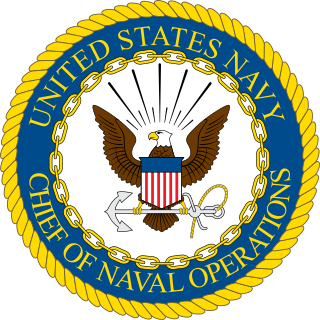
The chief of naval operations (CNO) is the professional head of the United States Navy. The position is a statutory office held by an admiral who is a military adviser and deputy to the secretary of the Navy. In a separate capacity as a member of the Joint Chiefs of Staff, the CNO is a military adviser to the National Security Council, the Homeland Security Council, the secretary of defense, and the president. The current chief of naval operations is Admiral Michael M. Gilday.

The North Atlantic Treaty Organization, also called the North Atlantic Alliance, is an intergovernmental military alliance between 30 European and North American countries. The organization implements the North Atlantic Treaty that was signed on 4 April 1949. NATO constitutes a system of collective defence whereby its independent member states agree to mutual defence in response to an attack by any external party. NATO's Headquarters are located in Haren, Brussels, Belgium, while the headquarters of Allied Command Operations is near Mons, Belgium.
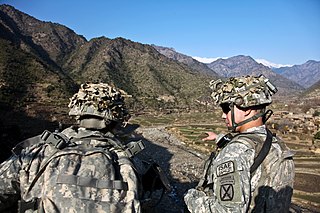
Operation Enduring Freedom (OEF) was the official name used by the U.S. government for the Global War on Terrorism. On 7 October 2001, in response to the September 11 attacks, President George W. Bush announced that airstrikes targeting Al-Qaeda and the Taliban had begun in Afghanistan. Operation Enduring Freedom primarily refers to the War in Afghanistan, but it is also affiliated with counterterrorism operations in other countries, such as OEF-Philippines and OEF-Trans Sahara.

The United States Air Force (USAF) is the air service branch of the United States Armed Forces. It is one of the eight U.S. uniformed services. Initially formed as a part of the United States Army on 1 August 1907, the USAF was established as a separate branch of the U.S. Armed Forces on 18 September 1947 with the passing of the National Security Act of 1947. It is the second youngest branch of the U.S. Armed Forces and the fourth in order of precedence. The U.S. Air Force articulates its core missions as air superiority, global integrated intelligence, surveillance and reconnaissance, rapid global mobility, global strike, and command and control.
The United States Armed Forces are the military forces of the United States of America. It consists of six forces: the Army, Marine Corps, Navy, Air Force, Space Force, and Coast Guard. The president of the United States is the commander-in-chief of the Armed Forces and forms military policy with the Department of Defense (DoD) and Department of Homeland Security (DHS), both federal executive departments, acting as the principal organs by which military policy is carried out. All six armed services are among the eight uniformed services of the United States.

The United States Navy Sea, Air, and Land (SEAL) Teams, commonly known as Navy SEALs, are the U.S. Navy's primary special operations force and a component of the Naval Special Warfare Command. Among the SEALs' main functions are conducting small-unit special operation missions in maritime, jungle, urban, arctic, mountainous, and desert environments. SEALs are typically ordered to capture or to eliminate high level targets, or to gather intelligence behind enemy lines.

The Gulf War was a war waged by coalition forces from 35 nations led by the United States against Iraq in response to Iraq's invasion and annexation of Kuwait arising from oil pricing and production disputes.

The United States Invasion of Panama, codenamed Operation Just Cause, lasted over a month between mid-December 1989 and late January 1990. It occurred during the administration of President George H. W. Bush and ten years after the Torrijos–Carter Treaties were ratified to transfer control of the Panama Canal from the U.S. to Panama by January 1, 2000. The primary purpose of the invasion was to depose the de facto Panamanian leader, general and dictator Manuel Noriega. Noriega, who for a long time worked with the Central Intelligence Agency, was wanted by the United States for racketeering and drug trafficking. Following the operation, the Panama Defense Forces were dissolved and President-elect Guillermo Endara was sworn into office. The United Nations General Assembly and the Organization of American States condemned the invasion as a violation of international law.

The Normandy landings were the landing operations and associated airborne operations on Tuesday, 6 June 1944 of the Allied invasion of Normandy in Operation Overlord during World War II. Codenamed Operation Neptune and often referred to as D-Day, it was the largest seaborne invasion in history. The operation began the liberation of France and laid the foundations of the Allied victory on the Western Front.

Operation Paperclip was a secret US intelligence program in which more than 1,600 German scientists, engineers, and technicians were taken from former Nazi Germany to the United States for government employment after the end of World War II in Europe, between 1945 and 1959. Conducted by the Joint Intelligence Objectives Agency (JIOA), it was largely carried out by special agents of the US Army's Counterintelligence Corps (CIC). Many of these personnel were former members, and some were former leaders, of the Nazi Party.

The United States Army Special Forces, colloquially known as the "Green Berets" due to their distinctive service headgear, are a special operations force of the United States Army that are designed to deploy and execute nine doctrinal missions: unconventional warfare, foreign internal defense, direct action, counter-insurgency, special reconnaissance, counter-terrorism, information operations, counterproliferation of weapons of mass destruction, and security force assistance. The first two missions, unconventional warfare and foreign internal defenses, emphasize language, cultural, and training skills in working with foreign troops. Other Special Forces missions, known as secondary missions, include: combat search and rescue (CSAR), counter-narcotics, hostage rescue, humanitarian assistance, humanitarian demining, information operations, peacekeeping, and manhunts. Other components of the United States Special Operations Command (USSOCOM) or other U.S. government activities may also specialize in these secondary missions. The Special Forces conduct these missions via seven geographically focused groups. Many of their operational techniques are classified, but some nonfiction works and doctrinal manuals are available.
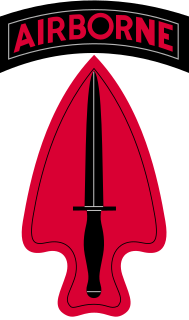
The 1st Special Forces Operational Detachment–Delta, commonly referred to as Delta Force, Combat Applications Group (CAG), "The Unit", or within JSOC as Task Force Green, is a special operations force of the United States Army, under operational control of the Joint Special Operations Command. The unit is tasked with missions primarily involving counter-terrorism, hostage rescue, direct action, and special reconnaissance, often against high-value targets. Delta Force and its Navy and Air Force counterparts, DEVGRU and 24th Special Tactics Squadron, are the U.S. military's tier one special mission units tasked with performing the most complex, classified, and dangerous missions directed by the National Command Authority.

The Central Intelligence Agency, known informally as "The Agency" and "The Company", is a civilian foreign intelligence service of the federal government of the United States, officially tasked with gathering, processing, and analyzing national security information from around the world, primarily through the use of human intelligence (HUMINT). As a principal member of the United States Intelligence Community (IC), the CIA reports to the Director of National Intelligence and is primarily focused on providing intelligence for the President and Cabinet of the United States.

The War on Terror, also known as the Global War on Terrorism and U.S. War on Terror, is an ongoing international military campaign launched by the United States government following the September 11 attacks. The targets of the campaign are primarily Islamist groups located throughout the world, with the most prominent groups being Al-Qaeda, the Islamic State, the Taliban, Tehrik-i-Taliban Pakistan, and the various franchise groups of the former two organizations. The naming of the campaign uses a metaphor of war to refer to a variety of actions that do not constitute a specific war as traditionally defined. U.S. president George W. Bush first used the term "war on terrorism" on 16 September 2001, and then "war on terror" a few days later in a formal speech to Congress. In the latter speech, George Bush stated, "Our enemy is a radical network of terrorists and every government that supports them." The term was originally used with a particular focus on countries associated with al-Qaeda. The term was immediately criticised by such people as Richard B. Myers, chairman of the Joint Chiefs of Staff, and more nuanced terms subsequently came to be used by the Bush administration to publicly define the international campaign led by the U.S. While it was never used as a formal designation of U.S. operations in internal government documentation, a Global War on Terrorism Service Medal was issued.

The United States Marine Corps (USMC), also referred to as the United States Marines, is the maritime land force service branch of the United States Armed Forces responsible for conducting expeditionary and amphibious operations through combined arms, implementing its own infantry, armor, artillery, aerial and special operations forces. The U.S. Marine Corps is one of the eight uniformed services of the United States.

The United States Navy (USN) is the maritime service branch of the United States Armed Forces and one of the eight uniformed services of the United States. It is the largest and most powerful navy in the world, with the estimated tonnage of its active battle fleet alone exceeding the next 13 navies combined, including 11 U.S. allies or partner nations as of 2015. It has the highest combined battle fleet tonnage and the world's largest aircraft carrier fleet, with eleven in service, two new carriers under construction, and five other carriers planned. With 336,978 personnel on active duty and 101,583 in the Ready Reserve, the U.S. Navy is the third largest of the U.S. military service branches in terms of personnel. It has 290 deployable combat vessels and more than 3,700 operational aircraft as of June 2019.

The United States Special Operations Command is the unified combatant command charged with overseeing the various special operations component commands of the Army, Marine Corps, Navy, and Air Force of the United States Armed Forces. The command is part of the Department of Defense and is the only unified combatant command created by an Act of Congress. USSOCOM is headquartered at MacDill Air Force Base in Tampa, Florida.
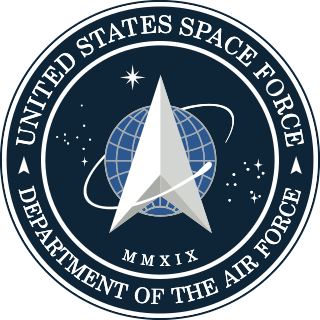
The United States Space Force (USSF) is the space service branch of the U.S. Armed Forces, one of the eight U.S. uniformed services, and the world's first and currently only independent space force. The U.S. Space Force is a military service branch, and along with sister-branch, the U.S. Air Force, is part of the Department of the Air Force, one of the three civilian-led military departments within the Department of Defense. The Space Force, through the Department of the Air Force, is overseen by the Secretary of the Air Force, a civilian political appointee who reports to the secretary of defense, and is appointed by the president with Senate confirmation. The military head of the Space Force is the chief of space operations who is the most senior Space Force officer unless a Space Force officer is serving as either the chairman or vice-chairman of the Joint Chiefs of Staff. The chief of space operations exercises supervision over the Space Force's units and serves as one of the Joint Chiefs of Staff.
References
This article incorporates text from the public domain Dictionary of American Naval Fighting Ships .